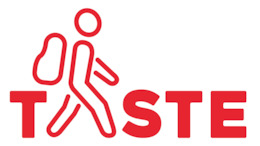Toolbox — For Training and Youth Work
All new tools in your inbox: Be the first to know about new tools for learning with our e-mail notifications.
Manual
Contributing to the sustainable development of European rural areas: the resources of the TASTE Project
The overall objective of TASTE is to build the capacity of local communities and stakeholders to be able to promote their cultural and natural heritage through sustainable outdoor offers while encouraging the practice of health-enhancing activities.
Aims of the tool
TASTE has 5 specific objectives:
1. to develop a set of specific skills in local communities (trekking associations, local promotion bodies, public bodies etc.), with a specific focus on the design and promotion of experiential trekking routes;
2. to create a European network of organizations operating in inland and rural areas and interested in the promotion of cultural and natural heritage;
3. to elaborate guidelines for the design and promotion of experiential food and wine trails;
4. to create aware, sustainable and connected communities able to generate commercial value and local growth through sustainable tourism and mobility;
5. to encourage the promotion of health-enhancing lifestyle and activities.
Description of the tool
The proposal of the TASTE project was generated by the growth of several types of niche tourism in recent years, such as adventure tourism, slow tourism, food and wine tourism, experiential tourism and the need to contribute to the sustainable development of European rural areas. Project partners have observed the need to equip associations, NGOs and local entities with specific skills needed to grasp the huge potential of sustainable tourism and outdoor sports.
The overall objective of TASTE is to build the capacity of local communities and stakeholders to be able to promote their cultural and natural heritage through sustainable outdoor offers while encouraging the practice of health-enhancing activities. Specifically, there will be a focus on experiential hiking and rural landscape enhancement. The natural and cultural heritage will become the raw material to design and shape excursions, and outdoor activities more generally in order to make them attractive to tourists and enthusiasts thus increasing the participation in outdoor sports and more in general in physical activities.
TASTE is based on the creation and dissemination of a participatory methodology and community-based approach aimed at encouraging sustainable and responsible types of tourism and mobility, compatible with the economy and the environment. The aim of the project is in fact to contribute to the capacity building of the staff of participating organizations, as well as future beneficiaries of the project results, in terms of sustainable rural tourism development and promotion of environmental-friendly practices and sports activities.
Available downloads:
Disclaimer
SALTO cannot be held responsible for the inappropriate use of these training tools. Always adapt training tools to your aims, context, target group and to your own skills! These tools have been used in a variety of formats and situations. Please notify SALTO should you know about the origin of or copyright on this tool.
Tool overview

http://toolbox.salto-youth.net/4166
This tool is for
Sport organisations, organisations for the promoption of local heritage,
and addresses
Environment
It is recommended for use in:
Strategic Partnerships
Behind the tool
The tool was created by
Consortium of the TASTE project
in the context of
Erasmus+ project "TASTE – Rural development through Experiential trekking” Nr. 101049950.
The tool has been experimented in
International training, national workhops
The tool was published to the Toolbox by
Stefano Paggetti (on 3 May 2024)
and last modified
23 April 2024
Comments
No comments have been posted yet.
If you want to comment on this tool, you need to be signed in with your MySALTO account. Sign in now